By Andrew Fenton
Source: Cointelegraph
Compiled by: Shaw Golden Finance
Ever since Robinhood co-founder Vlad Tenev showed up on stage at Cannes two weeks ago in a white suit and bow tie, imitating old-school movie star David Niven, everyone has been talking about tokenized stocks.
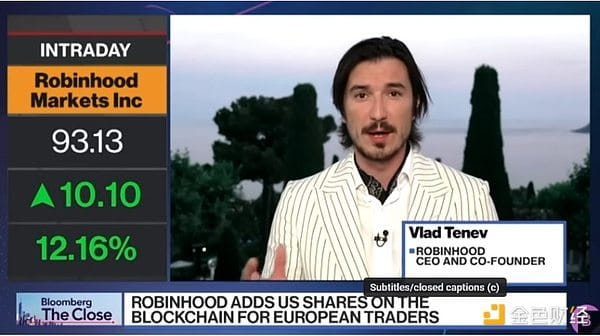
This is undoubtedly significant for the mainstream adoption of cryptocurrencies. Robinhood, a traditional financial stock trading platform with 26 million retail customers, is tokenizing stocks on Arbitrum and providing services to EU users through its user-friendly application interface.
No cryptocurrency wallets or seed phrases required — Tenev said this is a test of broader cryptocurrency integration, showing “what Robinhood itself could look like, built entirely on blockchain technology.”
That same week, Gemini launched its own tokenized stocks on Arbitrum, while Backed’s 60 xStocks went live on Solana, gaining support from Kraken, Bybit, Bitrue, and Gate.io.
Tokenized shares could also be just months away from launching in the U.S. after dShares issuer Dinari received a broker-dealer license and Ondo Finance acquired Oasis Pro to leverage its license.
Coinbase has been looking to launch tokenized stocks in the U.S. since 2018, and the company is reportedly seeking permission from the SEC to finally make that happen. Chief Legal Officer Paul Grewal called tokenized stocks “the future of finance and a top priority for the company.”
But this is not the first attempt at tokenized stocks. In the previous cycle, there were many failed cases by issuers.
While tokenization offers many advantages, the model that Robinhood and Kraken use to tokenize stocks also has many drawbacks. Here is a breakdown of the pros and cons of tokenizing stocks in 2025.
Con: Tokenized stocks are not real stocks
Critics argue that the tokenized shares offered by xStocks and Robinhood are simply synthetic representations of shares stored in a vault somewhere and do not confer any of the shareholder rights and protections associated with actual ownership.
In Robinhood’s case, even though its model uses licensed U.S. broker-dealers to issue tokenized shares and custody the underlying assets, those tokenized shares are still considered derivatives under EU regulations. Tenev calls them “derivatives backed by real shares.”
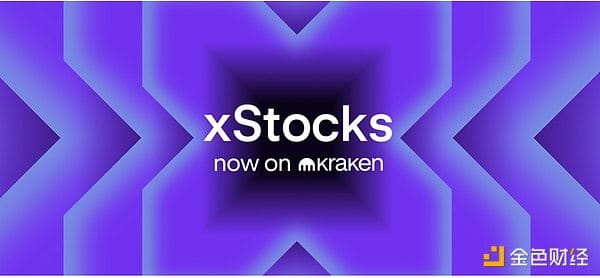
Backed’s xStocks token is also backed 1:1 by a special purpose vehicle (SPV) based in Liechtenstein. Even if Kraken or Bybit go out of business, the underlying assets are theoretically safe. The token is redeemable at the OTC price when the market opens.
Alan Keegan, DeFi portfolio manager at M31 Capital, said that’s halfway there. “We’ve solved the problem of issuing certificates on-chain for off-chain assets through tokenization,” but he added that there’s still a long way to go.
"In order for on-chain transactions of securities to truly represent the transfer of that security, regulatory issues need to be addressed and legal infrastructure needs to be established," he said.
“To build the infrastructure to solve this problem requires a considerable degree of legal knowledge, traditional financial knowledge, proficiency in blockchain technology, and, frankly, capital investment.”
The closest example to date is Securitize’s Exodus token on Algorand, which represents direct legal ownership of securities on Securitize’s shareholder register.
“It will take time, but native tokenization is a necessary first step,” said Carlos Domingo, CEO of Securitize.
Unless shares are represented on-chain in a compliant and legal manner, there is no way to decentralize stock ownership. Securitize is one of the few platforms in the U.S. that can do this.
Neutral opinion: Tokenized stocks are in a legal gray area
Tokenized stocks exist in a legal gray area, and what Robinhood and xStocks are doing is similar to what Uber did with its ride-sharing app a few years ago, testing the boundaries of the law.
Robinhood’s tokenized shares are currently only available in the EU market, but since Robinhood is a public company and has partnered with a U.S.-listed broker-dealer to issue U.S. securities, U.S. regulators may decide to shut it down.
The Securities Industry and Financial Markets Association (SIFMA) has urged the U.S. Securities and Exchange Commission (SEC) to reject trading models that do not comply with the National Stock Market System (NFM) regulations.
However, the new SEC Chairman Paul Atkins expressed support in principle. "Tokenization is an innovation. The SEC should focus on how to promote market innovation," Atkins said in an interview with CNBC.
OpenAI also highlighted the legal issues surrounding Robinhood’s sale of tokens tied to its private stock, noting that Robinhood would need to approve any token transfers, which the company has not yet done. The Bank of Lithuania subsequently launched an investigation.
Rob Hadick, general partner at Dragonfly, said at X that the risk for token holders is that private companies will eventually “just cancel the sale to shareholders who violated their shareholder agreements.”
But Tenev said that while SpaceX or OpenAI aren’t keen on tokenizing their private shares, many more companies see it as a big opportunity.
“A lot of private companies have been contacting me asking ... when can we tokenize our private stock?” he said recently. The bigger legal issue with selling tokenized private stock to the public is that it essentially bypasses the disclosure and transparency rules of public companies.
If companies can sell private shares to raise capital without the expense and compliance requirements of an IPO, why would anyone go public?
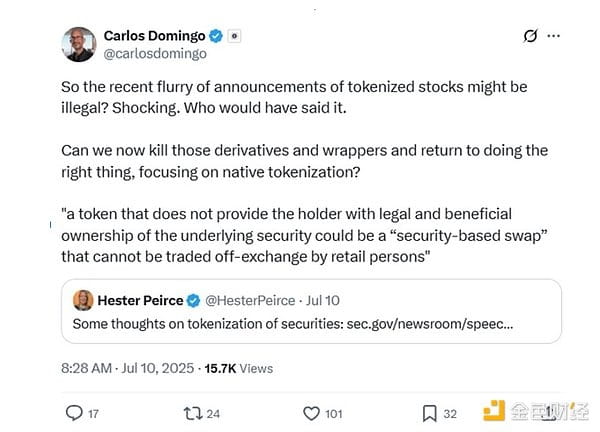
Advantages: 24/7 trading of tokenized stocks and application in DeFi
Traditional markets are closed about 81% of the year, which means tokenized stocks that trade 24/7 would have a big advantage.
Tokenized shares on xStocks and Robinhood will initially be available 24 hours a day, five days a week, but Tenev said that will soon change.
“Where it gets really interesting is when you connect it to Bitstamp, and you can trade it 24/7. At that point, the stock tokens will behave like other cryptocurrencies like Bitcoin and Ethereum,” Tenev said. The next stage will be to integrate these assets into decentralized finance (DeFi).
“So you can imagine combining collateralized lending with true self-custody, which I think is going to be really powerful for equities because it frees your equity tokens from being tied to any particular broker or cryptocurrency provider.”
Keegan agrees that 24/7 operation, lower costs, more reliable execution, and faster settlement are huge advantages, as well as the potential for composability in the DeFi ecosystem.
Blockchain platforms may outcompete traditional financial platforms
Galaxy Digital’s analysis believes that 24/7 trading of tokenized stocks on Bitstamp poses a huge threat to traditional markets such as the New York Stock Exchange:
“This directly challenges the advantages of highly concentrated liquidity and trading activity enjoyed by traditional financial exchanges (such as the New York Stock Exchange)… More brokers adopting blockchain-based trading strategies may put tremendous pressure on traditional exchanges.”
But Securitze’s Domingo believes there’s still a long way to go. “To get to the point where the entire market operates 24/7 on crypto rails, we need three things,” Domingo said. “Clarity in regulation that allows on-chain trading venues to exist under a modified framework. Liquidity and infrastructure — market makers, secondary markets, and settlement systems — that can reliably operate outside of traditional trading hours, and institutional trust and adoption.”
Traditional finance is not going away quietly either, with traditional markets already offering pre-market and after-hours trading, which helps cover about 16 hours in a day.
Arca, the electronic trading platform owned by the New York Stock Exchange, also received approval in February to provide trading services 22 hours a day, five days a week, and is expected to start extended trading hours this year.
Con: After-hours volatility in tokenized stocks
Dragonfly’s Hardik noted that after-hours trading can raise a number of issues.
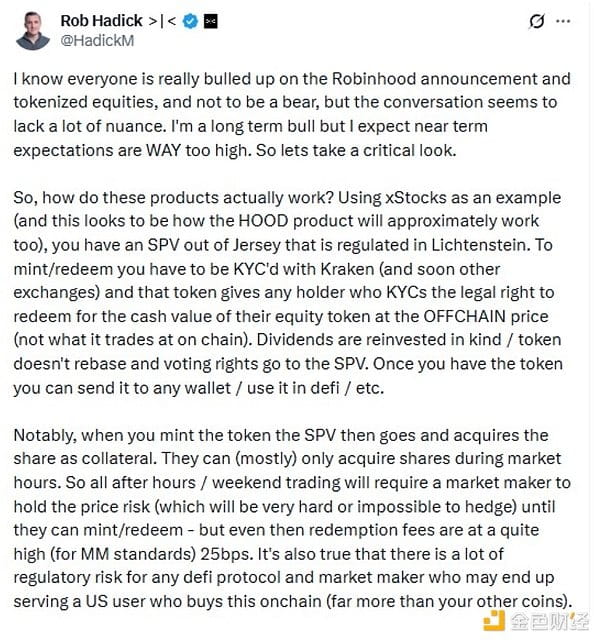
He cited xStocks as an example, saying that when investors buy tokens after hours, the special purpose entity (SPV) must purchase the stock when the market opens, which exposes market makers to price risk.
This means spreads will widen and market makers may eventually withdraw liquidity entirely when markets come under pressure. “If these factors permeate into the DeFi lending and derivatives space, it will create huge chain liquidation risks,” he said.
He also noted that the tokens only entitle holders to the off-chain price, meaning the stock could quickly return to that price when the market opens.
“This means that when people buy during the weekend/after-hours period of low liquidity, but the stock market opens below what token buyers expected, you can see rapid losses at the open, borne primarily by retail investors,” Hardik said.
“Functionally, this means they are simply not good products [...] They cannot serve the complex, real, and global stock markets. And they may not even meet the needs of professional cryptocurrency traders, who know they can get better prices and lower risk elsewhere.”
Disadvantages: Stock tokenization comes with fragmented liquidity
Tokenizing shares by multiple issuers also results in fragmented liquidity. As Mike Dudas of Crypto VX joked, imagine a future where you had to choose between “rTSLA, cTSLA, sTSLA, xyzTSLA, ethTSLA, solTSLA, or hyperTSLA.”
Johann Kerbrat, Robinhood’s head of cryptocurrency, acknowledged that this would be a problem. “I hate the idea of having a Tesla-Kraken token and a Tesla-Robinhood token at the same time,” he said. “Instead of actually moving forward and creating a better financial system, we’re fragmenting liquidity.”
“Isn’t this exactly what Robinhood is doing?” Domingo sarcastically asked on X. Having multiple issuers of tokenized shares also greatly increases the likelihood that one of them will go bankrupt in some way, causing heavy losses to token holders.
Tokenized stocks failed in 2021
In the previous cycle, Synthetix launched synthetic tokens that provided exposure to stock prices such as Tesla in 2021. sTSLA saw only 798 trades in total before it was phased out that year.
Lack of liquidity is one reason, but it’s also possible that DeFi investors are more inclined to speculate on altcoins with 10x potential upside than on stocks that may fluctuate by a few percentage points in a month.
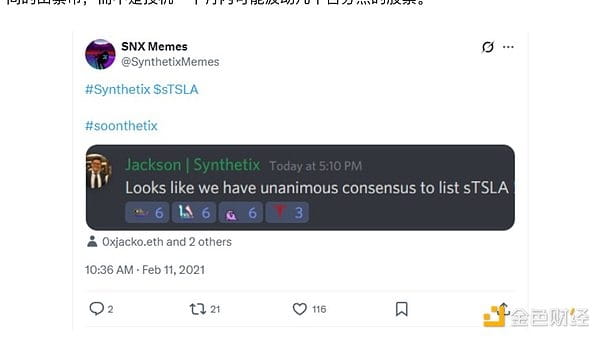
Mirror also offered synthetic stocks, but collapsed along with Terra. Binance also offered stock tokens for a few months in 2021, but delisted them after opposition from regulators in the UK and Germany.
The most "successful" issuer in the last cycle was FTX, which issued tokenized shares backed 1:1 through CM Equity. Its trading volume peaked at nearly $1 billion in October 2021. But after FTX collapsed the following year, it was reported that CM Equity had withdrawn from the protocol in December 2021, calling the support of tokenized shares into question. When FTX collapsed, holders of tokenized shares lost their funds.
However, one company survived those dark days. Securitize, which tokenized shares of wallet provider Exodus in 2021, has a market cap of $294.7 million, alone accounting for 78% of the entire tokenized stock market today.
Domingo pointed out that it’s no longer 2021, the regulatory environment is favorable, and asset managers such as BlackRock, Apollo, and Hamilton Lane are jumping in. “The credibility provided by top asset issuers is now extending from tokenized bonds and private credit to other assets such as tokenized equities,” he said.
How will tokenized stocks affect cryptocurrency prices?
As the blockchain with the most stablecoins and real-world assets (RWA), Ethereum is poised to benefit from wider adoption of tokenized stocks. Robinhood’s choice of Ethereum L2 Arbitrum is seen as a huge vote of confidence in its ecosystem and L2 roadmap.
Keegan said financial institutions can customize L2 to comply with KYC and privacy requirements and support transaction rollbacks. "The most exciting feature of L2 scaling infrastructure is that L2 can inherit Ethereum's decentralization and reliable neutrality guarantees, while also being built according to the needs of specific use cases, including regulatory compliance."
Ethereum’s price has risen by a quarter since the announcement. Solana has also proven itself to be very popular among retail investors over the past two years, so it will also benefit from the wider adoption of xStocks.
Some believe tokenized stocks will compete with the money currently dispersed across a variety of altcoins. But Domingo believes a halo effect is more likely.
“We don’t see tokenized stocks and altcoins necessarily competing for capital. Instead, we see traditional financial institutions embracing blockchain infrastructure, leveraging the same underlying technology as DeFi. This is undoubtedly positive for the staying power and expansion of the entire cryptocurrency ecosystem.”



